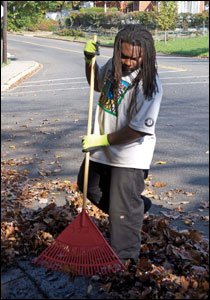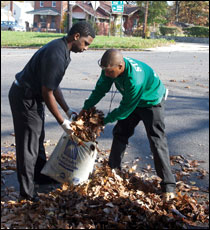|
Taking Out the Trash
Erica Goldman |


Conservation volunteers, like Desmond Williams (top), help Earth Conservation Corps leaders Kelly Hart and Kevin Jeffrey (above) remove leaf litter and debris from storm drains (above left). They'll weigh the trash that they collect, collecting data to determine how well screens in the drain work to keep trash out of the Fort Dupont subwatershed of the Anacostia River.
Credit: Erica Goldman. |
TUESDAY AFTERNOON. The lunch break has ended and the members of the Earth Conservation Corps' (ECC) River Team gather near the entrance of the Matthew Henson Center, a warehouse-like building tucked in the shadow of Nationals Stadium in Southeast D.C. Wearing uniform ECC T-shirts with baggy black pants, the team is heading out to clean trash and leaves out of catch basins around Fort Dupont Park. It rained heavily over the weekend, leaves blowing off trees by the thousands. There's likely to be a lot of debris.
Every Tuesday and Thursday since October 2008, Corps members have worked to install and maintain screens in the catch basins of the Fort Dupont subwatershed of the Anacostia. It is part of an effort to make just one combined sewer overflow (CSO) into the river totally trash free.
Charles Glass, a professor of environmental engineering at Howard University in the District, is the architect of this project, designed to test three different screen designs for their ability to keep large pollutants like trash out of the river. So far, with the help of volunteers from the Earth Conservation Corps, a nonprofit organization that focuses on youth development and environmental service, he's outfitted 35 out of 50 catch basins in the subwatershed.
Glass's work goes straight to the heart of the Anacostia River's most basic problem: Lack of stewardship. Through his work with Corps members, all of whom have a history with the juvenile justice system in the District, he's tackling head on the challenge of engaging a community troubled by poverty, drugs, and violence to become caretakers of their local surroundings.
The Anacostia watershed is a mess, he says, "because people are not empowered to change their environment." In this community, he says, "you are talking about having food. You are talking about trying to have a better education system." For public officials and for residents, the environment doesn't rank high on the list of priorities.
Back at Howard University, a historically black university, Glass teaches civil engineering and environmental microbiology. He's lived and breathed engineering for as long as he can remember. At Montgomery Blair High School in Silver Spring, Maryland he was tracked early because of his high math scores. One summer in high school, he attended a minority summer access program at the University of Delaware where he was exposed to all of the different disciplines in engineering. He continued his studies as an undergraduate at Johns Hopkins University and received his Ph.D. from the University of Colorado. His research program focuses on advances in wastewater treatment, design of bioretention cells, and Low Impact Development (LID).
His work with the Earth Conservation Corps on the Anacostia River takes a much more fundamental approach. Cleaning a catch basin is one of the most basic things that you can do. "This isn't science," he says.
But the Anacostia River has some pretty basic problems. "Why do I see floating feces in the Anacostia River? I would like not to see floating feces in the Anacostia," Glass says. "Why do I have to see trash? Trash is one of the most basic pollutants. We don't even teach 'trash' in engineering... That is so 1880s."
|
Leading the charge, Howard University professor Charles Glass tests how well different screen designs work to keep trash and leaf litter out of storm drains in the Fort Dupont area.
Credit: Erica Goldman. |
And while cleaning a catch basin might be fairly simple work, managing a crew and helping to instill a strong work ethic in people can be quite challenging, he says. This is where the Earth Conservation Corps plays a pivotal role. This is where Glass is committed to contributing his time and energy.
Since 1989, the Earth Conservation Corps has worked to provide career skills and environmental training to unemployed youth from troubled and disadvantaged backgrounds. Corps members complete a 9-month program of environmental service, cleaning the Anacostia River, rebuilding shoreline, and taking documentary video footage of their work. They receive a living stipend and, upon completion of the program, a fellowship to support educational expenses.
Glass's project is funded by a grant to the Earth Conservation Corps from the District Department of the Environment. Every Tuesday and Thursday, he tries to get out in the field with the Corps' River Team, although he's had to take a break while recovering from leg surgery. The team cleans the storm drains, raking leaves and debris into large trash bags. Then they weigh what they've collected, gathering data on how much trash they're keeping out of the Anacostia River because of the screens that have been installed, evaluating which screen design works best.
Relative to the scale of problems facing water quality in D.C. and throughout the Chesapeake watershed, catch basins are a cheap and easy fix, says Glass. It only costs $8,000 to retrofit a catch basin, he says. For $15,000 the basin can be outfitted with a Granulated Activated Carbon (GAC) filter. This will keep a "huge load" out of the river.
|
Read an online feature about the annual Trash Summit, an initiative aimed at cleaning up the Potomac River and its watershed: www.mdsg.umd.edu/cq/trashsummit |
In practice, it's not so easy. At the core, the problem is one of political will, according to Glass. A culture exists within the D.C. Water and Sewer Authority and the Washington Suburban Sanitary Commission that is resistant to change. For an economically disadvantaged community, environmental stewardship can be a tough sell.
Achieving a trash-free river, says Glass, will require a shift away from business-as-usual — within the City Council, the Water and Sewer Authority, and the community. Ultimately, it will come down to how much we choose to care.
To find out more about the Earth Conservation Corps, visit www.ecc1.org/
|